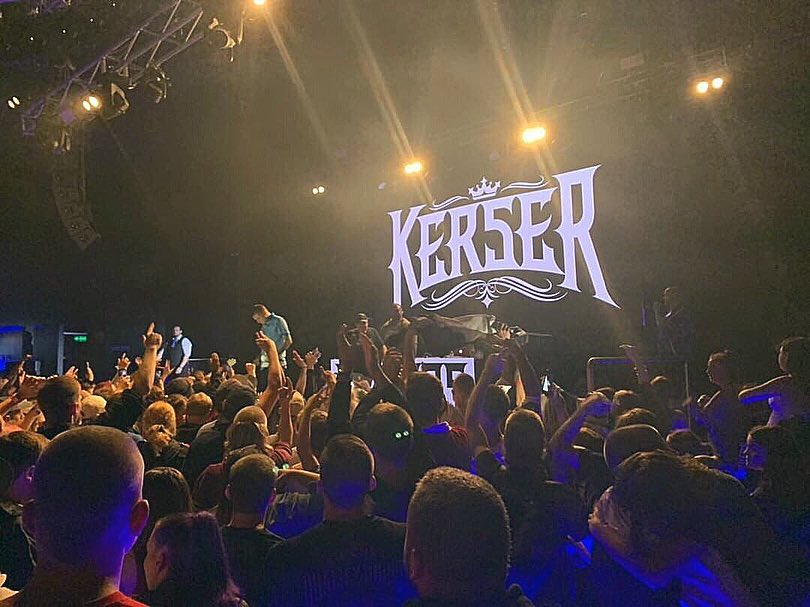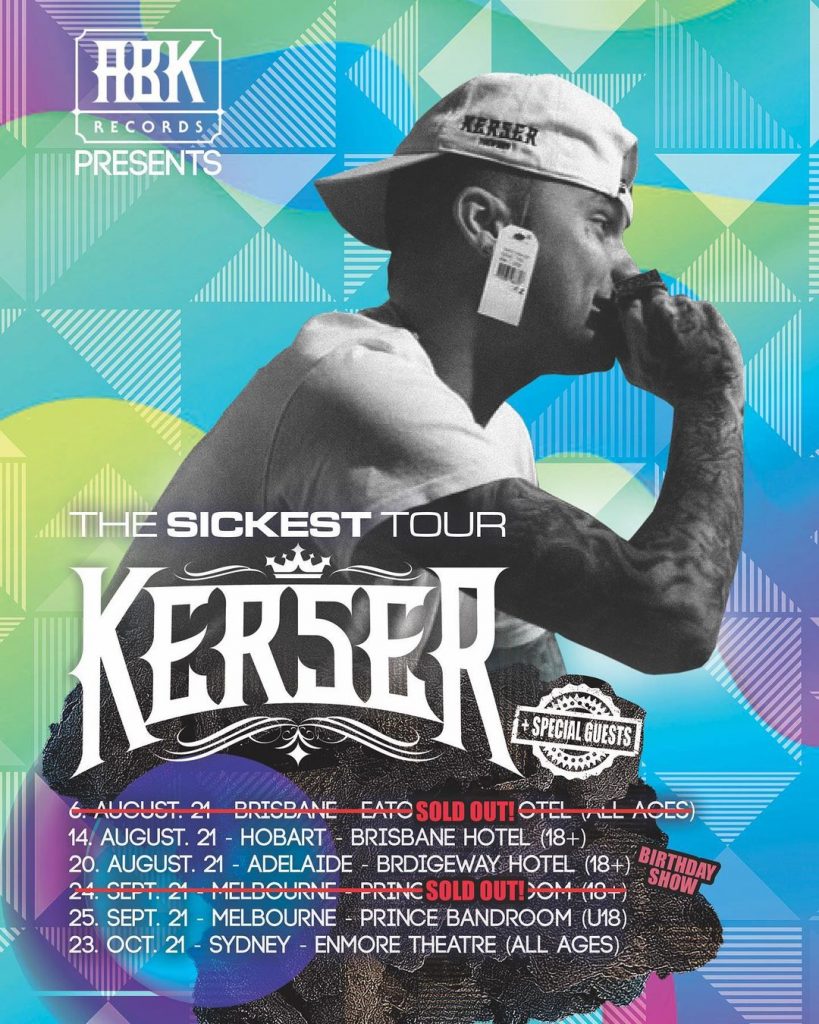If there was any doubt about the impact Campbelltown-born rapper Kerser has had on the genre, it was certainly blown out of the water with his latest release “Winner”.
A scathing attack on the haters, the slickly-produced music video for “Winner” already boasts over one million views on YouTube since its April release, with Kerser telling Rolling Stone Australia that the catchy track is “a taste of what’s to come.”
“The clip was pretty next level,” Kerser says.
“It took a bit longer than previous clips, which we usually turn around really quick, but was definitely worth it. I actually flew up to Brisbane to shoot it, which was a lot of fun and it came out just as good as I expected.

Kerser recently dropped his single “Winner”. Credit: YouTube
“As for the album, there are so many styles we’re trying to cover to make this the strongest and best album I’ve released,” he says, adding, “I’m planning to drop at least two-three more singles before album ten drops.”
While the 33-year-old had long been adamant that his tenth album would be his last, he admitted that he “can’t see [himself] ever stopping music.”
He adds, “But as far as albums go, I’m pretty sure this will be my last. Fans can expect the type of music they have been asking me to recreate for years now with a modern twist,” he said, adding, “I won’t stop working on it until it’s perfect – no time limit.”
Love Music?
Get your daily dose of everything happening in Australian/New Zealand music and globally.
The lyrics of “Winner” seem to take aim at those who have criticised him throughout his career: “Why I got ’em all so bitter? Swear they gonna hate if you a winner.”
After years of the media and other artists firing shots at him, Kerser takes the jabs like water off a duck’s back and remains perpetually unbothered by those who try to belittle his success.
“I just had some stuff to get off my chest, really,” the rapper explains of the meaning behind the track.
“[Critics] aren’t on my radar and it’s usually someone chasing some clout and trying to get fame off my name.
“If I do happen to see it, I straight away think they must be desperate, broke and falling off to take shots at someone who set the blueprint for the path they are trying to follow. The big majority of the scene are fans, though, so that only goes for the jealous desperate rappers.”

Kerser is gearing up to release his tenth and likely final album. Credit: Supplied
It is this self-assuredness and unabashed confidence that fans have come to know and love from Kerser – and given his self-made success, it’s hard to think of a reason why the rapper shouldn’t be cocky.
After being shunned by radio stations for his controversial lyrical content, he’s worked hard at amassing a legion of dedicated fans and single-handedly building a music empire without the aid of traditional promotion trails seen from most of today’s artists.
He quickly solidified himself as an underdog of the Australian rap scene, and now boasts a whopping 188 million YouTube views. He once dominated YouTube’s Australian Artist Charts for 252 weeks, making him the only Australian artist of all genres to consistently chart on the platform.

The rapper’s shows have consistently sold out since his rise to the top. Credit: Supplied
Recently, Kerser made headlines after he called out triple j for finally playing his music – a move he felt was hypocritical after they allegedly blacklisted his songs when he first arrived on the scene.
“When I started, triple j was the go-to for all Australian hip-hop – it’s how any rapper prior to me got big. Without triple j it was unheard of a rap artist to blow up,” he explains.
“After my first release [with Obese Records], I noticed I was bigger than 80% of the roster at the time yet I was the only artist who was not receiving airplay on triple j.
“My manager and my label kept sending music, but the label told me that triple j didn’t want to play it due to the message and content. This went on for another two years before I was like, ‘fuck them, I’m gonna show them.’”
“Word had got around that I was blacklisted and that they didn’t want a bar of my tracks or any West Sydney street rap. I made it my mission to be the first successful massive artist without triple j, while saying ‘fuck triple j’ the whole time – on tracks, on stage, on my socials, everywhere.
He continues, “triple j continued to openly ignore the music and make sure I didn’t have a voice – but I blew up without them through my YouTube, socials and hard work.
“Now, after I’ve set the blueprint for other rappers, triple j has turned around and started to play and actually push ‘street rap’ – especially from West Sydney – after never wanting to be part of it. They act like they want the sound to blow up and have been backing it forever, which is not the case – it’s the complete opposite.
“They tried killing the sound until it got so big they had no choice but to play street artists including myself. I proved you don’t need the triple j machine pushing your music.
“So for trying to kill my career, trying to kill Aussie street rap and trying to stop me from making a living and following my dream, it has, was, and always will be ‘fuck triple j’”.

The Campbelltown-born MC carved a path for himself within the Australian rap scene. Credit: Supplied
When approached for comment on whether or not Kerser had indeed been blacklisted by the stations, triple j politely declined to respond, with a representative saying they “don’t publicly comment about specific artists’ playlisting or music.”
Someone who was able to give insight into the situation, however, was fellow Australian rapper The Tongue, who worked at triple j amid Kerser’s meteoric rise to fame.
He reveals that despite constant fan requests to play Kerser, who was one of the hottest up-and-coming young rappers at the time, triple j did not.
“I can’t say that they had an official station policy when I was there,” The Tongue explains.
“I don’t think that they would create a memo specifically saying ‘this person has been blacklisted’, but I would imagine the people in charge of choosing music decided he’s not going to be chosen.”
“But he was a requested artist for sure,” he adds.
As for why exactly the station allegedly chose to “blacklist” the MC, he says: “My personal feeling is that when he first came out, Kerser represented an aspect of Australian culture which hadn’t really been exposed in that way before, and a lot of people and a lot of youth saw themselves in him or could relate to him in some way.
“And I don’t think what triple j is trying to relate to is the struggles of the working class.”
He adds, “I just think that it’s quite amazing that it feels as if our youth broadcaster has gone out of its way to not amplify that message.
“Maybe he had a run-in with someone at the station, maybe he abused someone, maybe there was a tweet he fired off about them that they didn’t like, but should they have been shutting the door on his talent and his abilities for his entire career?”
The Tongue adds, “If the stats show, the sales show, the ticket sales show, and the YouTube views show that an independent artist is resonating with the youth in an incredible way, then at what point do you say, ‘This is what the youth are telling us the radio station is important to them’.
“The beauty of his situation is that he’s proven you don’t need them, and that’s probably the best victory of all – that he’s broken the mould.”
For Kerser, the old adage ‘the best revenge is living well’ rings true, and despite the setbacks he’s faced throughout his career, he’s taken it all in his stride as he focuses on his music.
“I’m just keen to get back amongst the shows,” he says. “We’ve got a crazy set lined up for this tour, doing classics I’ve never done live before that fans have been asking for for years. I’ve been waiting to hit the stage since the end of 2019.
“I’m keen as!”
“Winner” by Kerser is out now



































